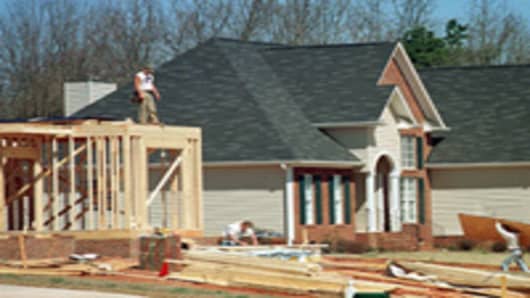In all the headlines screaming about the big banks and their messy foreclosure practices, we may have overlooked another set of players in the scandal: Home Builders.
The nation's big builders, as many of you new construction buyers may already know, have mortgage arms (pun intended) which originate loans.
Builders originated $205 billion of loans from 2005 to 2008, according to Credit Suisse's Dan Oppenheim. Like the big banks, their loan representations are now in question as well, which makes them a target of all the folks who bought those loans.
"We see risk of $1.0 bln in additional mortgage repurchases (spread over several years) related to reps and warranties on loans originated by homebuilders between ‘05 and ‘08, which would represent 9% of book value on average," estimates Oppenheim. He notes that while banks and other big lenders have taken the largest reserves on mortgages sold to the GSE's (Fannie Mae and Freddie Mac), private label originations will also cause trouble as investors ramp up put-backs.
So who's at risk?
Pulte and Hovnanian, according to Oppenheim.
He estimates exposure could hit 16 percent of book for Pulte and 19 percent for Hovnanian. Toll Brothers and Meritage would have the least risk as Toll requires larger down payments, and Meritage's mortgage operation is pretty small.
Home builder analyst Ivy Zelman, who estimates that builders have recorded $330 million of losses related to loan purchases from 2008 to 2Q2010, sets up some best-to-worst-case scenarios and focuses on DR Horton, Lennar and Pulte as having the highest risk.
"Under our base case where put backs equal 20% of “troubled loans” and severities are in the 45-50% range, we estimate modest hits to book value ranging from 5% for DHI to 7% for PHM. This scenario implies that reserves increase roughly three-fold from the charges taken over the past two years. On the other hand, our bear-case assumptions would result in 9-13% equity erosion, while our bull case results in just a 2-3% hit to book value. In all three scenarios, we would expect these charges to be recognized over a multi-year period."



